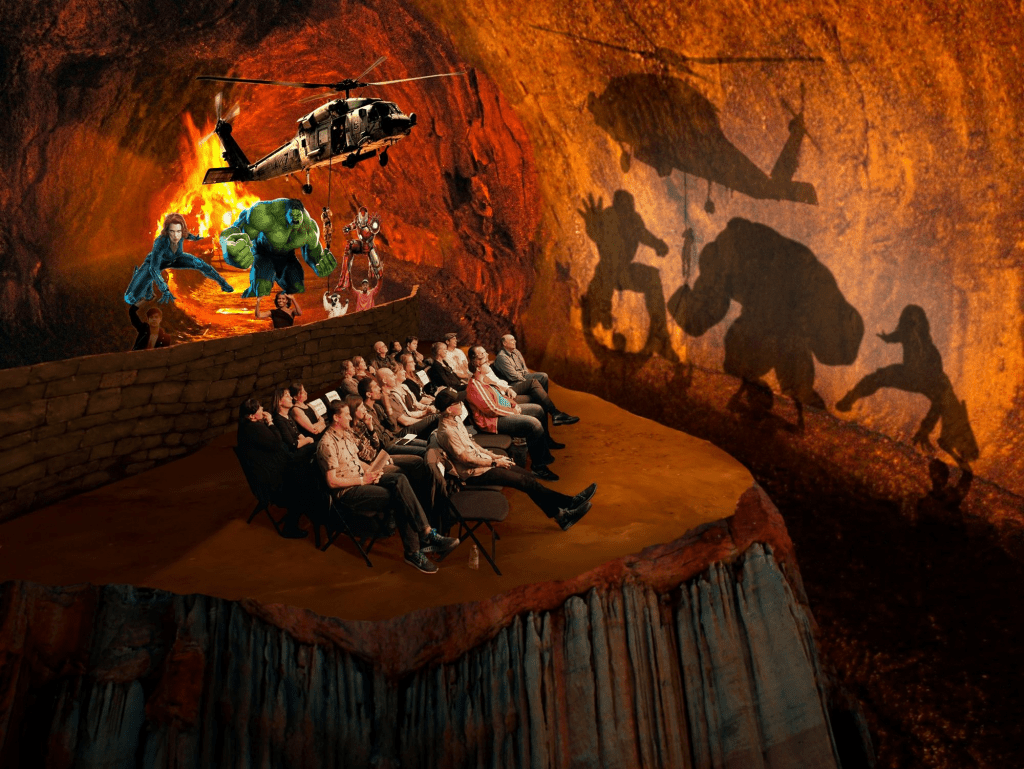Imagine if you will…
An evil dictator is on the brink of making a nuclear bomb at a secret facility carved deep inside the Zagros mountains. With no option, the American military deploys jets and, against all odds, destroys the factory — then flies home to the strains of “[Highway to the] Danger Zone”.
An evil dictator is on the brink of using a nuclear bomb. With no option, the American military deploys secret agents and, against all odds, triggers a democratic revolution by blowing up the dictator in his helicopter to the strains of Katy Perry’s “Firework”.
I’ve just outlined the plots of Top Gun: Maverick starring Tom Cruise and The Interview starring Seth Rogan. But the plots also describe real world aspirations — here towards Iran and North Korea — from top policymakers across NATO countries.
These parallels are no coincidence. Because each film was subject to script changes imposed by Washington. In the documentary Theaters of War, we show how the CIA and Department of Defense have exercised editorial control over thousands of films and TV shows in exchange for lending equipment such as helicopters to producers to use on screen.
Such films reflect and construct the paranoid fantasies of our imperial masters, most of them with direct script input: kindly Marines unjustly slaughtered for handing out grain to hungry Africans in Black Hawk Down; US politicians too innocent to realise that arming Islamic terrorists will lead to 9/11 in the Julia Roberts hit Charlie Wilson’s War, and the Gerard Butler film Kandahar in which an evil dictator is on the brink of manufacturing a nuclear bomb at a secret facility carved deep inside a mountain. With no option and against all odds..:

Is it any wonder that 30% of Americans in one poll said they want to bomb Agrabah, the capital city in Disney’s Aladdin?
Is it any wonder that our politicians, as though clutching rosary beads, prefigure Russia’s invasion of Ukraine with the word “illegal” with no sense of irony and “unprovoked” with no sense of history? When was the last thing you saw a depiction of Russia which didn’t have it crawling with tyrants? Red Dawn? Rambo; Air Force One; Hunter Killer; James Bond; Jack Ryan; 24; Homeland; Stranger Things … the 6 O’Clock News?
The US government has suppressed scripts — but on others it has overturned their original messages. In the Iron Man screenplay, Robert Downey Jr’s hero was opposed to his father’s arms business. After rewrites, he became the ultimate evangelist for a bloodless industry: “Peace means having a bigger stick than the other guy”.
For four decades, almost all script changes had been suppressed until our team used the law to acquire large bundles of government documentation. Regardless, the Defense Department’s entertainment boss compared his role in the “court” of Hollywood to that of a “minor eunuch”. This from a man who controlled hundreds of titles including 12 of the top 20 grossing film franchises — more than Steven Spielberg. His squadron of censors have ensured none of the scripts passing their desks depict: war crimes; coups; assassinations; torture, or indeed anything that “reminds the public” of the “nasty conspiracies” in which America has engaged.
Now, Hollywood producers and celebrities are perfectly capable of being terrible on foreign policy issues even without state interference. Consider Benedict Cumberbatch, who played the Wikileaks founder, Julian Assange, in the 2013 film Fifth Estate. Assange tried reasoning with Cumberbatch, saying the studio will use him as “a hired gun, to assume the appearance of the truth in order to assassinate it”. Sherlock scoffed, “as if I am an easily bought cypher for right-wing propaganda”, and “I’ve worked far less hard for more money on other projects”. Cumberbatch demurred when asked to oppose the 35-year prison sentence for Assange’s colleague Chelsea Manning, pontificating, “Isn’t it hypocritical to say, we should know everything about you as a government, but the government can’t know anything about us?” Curiously, while Fifth Estate presents Assange as a shifty egotist, it is Cumberbatch who claims “there is only personal truth” and wanted to play the Assange lead because “I’m a vain actor.”
Acclaimed as a singular journalist, Julian Assange is now well into his fifth year in Britain’s highest security prison— without trial — on a Byzantine set of espionage charges. Assange used incontrovertible documentation to expose: US massacres; sadistic detention procedures; corporate suppression of data on global warming, and the Democrat’s backroom machinations to destroy their own socialist Presidential candidate, Bernie Sanders, in favour of the less popular hawk, Hillary Clinton. Those intimately involved in Assange’s case say the state has meted out “torture”, which has included providing him with an HIV diagnosis (before later claiming it was a “false positive”) and giving him a computer to conduct his defence with all the keys superglued down. And where was Cumberbatch in the middle of all this? Making The Courier, whose production was supported from the outset by the CIA and which mangled Cold War history to overhype the threat from Moscow. Quelle surprise.
Or consider the political activities of another awfully nice and clever celebrity, Sacha Baron Cohen. Cohen’s production company claims they deceived the US military to gain entry into a base in Alabama, but the scenes there feel staged, setting up Cohen’s flamboyantly gay character Bruno for a series of one-liners. Cohen apparently escaped by squeezing under a rapidly closing gate while guards yelled in pursuit. Hmmm.
Another time, Bruno interviewed a “terrorist” discovered through Cohen’s CIA contact. This was, in fact, a Palestinian greengrocer who said Cohen told him the interview would be about his peace activism. The resultant case was settled for an undisclosed sum.
In Israel, actually, Bruno was beaten by a crowd of homophobic Israelis, who, angered by his camp clothing, started to stone him on camera. For the first time, Cohen broke character. He desperately yelled that he was an Israeli Jew, not a homosexual foreigner and fled for his life. The footage, though, has never emerged even though it would presumably highlight racism, supposedly what Sacha Baron Cohen is all about. Wrong racists.
Call this propaganda, soft-censorship, or threat construction — whatever — these sorts of attitudes shape our foreign policy, and they are ridiculous: in 2003 the Americans said Iraq had 5,000 tonnes of mustard gas but got there and couldn’t even find mustard. After 13 years of punitive sanctions a Baghdad hotdog was a rum affair indeed. This Spring, the Americans invoked the terror of China’s spy balloon — gee, I hope the Chinese don’t send any more party paraphernalia. I’d hate for them to make us stand on a Lego.
Even foreign relations specialist John Mearsheimer, propelled to fame by his opposition to the war, does so on the grounds that we should be allying with Moscow to threaten China, oafishly asserting that if not Beijing will end up stationing missile systems in Mexico and Canada to target the United States. This is so dumb I can hardly process it. There is no prospect of such a scenario – the US has ruthlessly enforced the Monroe Doctrine for precisely two hundred years, claiming exclusive control of a huge sphere of influence, as Mearsheimer well knows.
Of course, outside the political fictions projected in the blue glow of our spooky little monitors, there is a real threat — it is us. Our hubris. On Ukraine alone, leaks by people of conscience indicate casualties could be approaching half a million in a deadlocked war and yet still we insist we “weaken” Russia indefinitely (”balkanisation”, for many) and, it seems undeniable, detonate our own oil supply lines and bring the fight both to Crimea and the Kremlin.
In key ways, ours is a demented, fearful political culture, egged on by hubristic, celebrity-charged visions of its own self-righteousness. We urgently need to be a purposeful peace movement, with our eyes open to how the media holds any form of compromise in abject contempt.
(Featured Image: Courtesy of Matt Alford)





